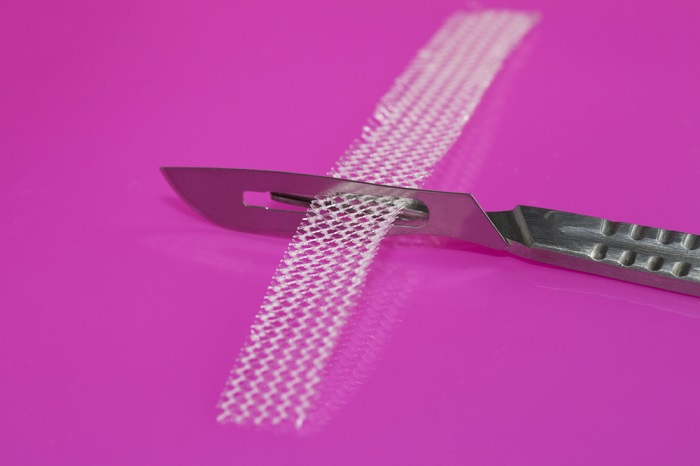
During the past two decades, thousands of women have turned to vaginal mesh implants in the hopes of treating pelvic organ prolapse and stress urinary incontinence. The promise of a pelvic floor miracle drew many women in, yet none of them ever expected the agony that they were to be left in.
The usage of vaginal mesh in pelvic organ prolapse and stress urinary incontinence surgery has caused chronic pain for thousands of women, so why was it ever approved as a safe method of treatment?
The Latest on Vaginal Mesh
According to Johnson & Johnson, the pharmaceutical giant, tension-free vaginal tape devices (TVT) were launched in Europe in late 1997.
However, at this point, trials for the efficacy of tension-free vaginal tape had not even begun to recruit patients.
The introduction of vaginal mesh is also clouded by questionable studies and payment allegations.
The first round of tests conducted by Swedish obstetrician, Ulf Ulmsten, for vaginal mesh had astonishing results. 84% of women were cured of incontinence within two years; but, this proved a case of statistical bias as the study was based on just 75 specially selected Swedish women and performed solely by Ulmsten’s gynaecologists.
Johnson & Johnson offered Ulmsten a $1 million deal if he could produce even better results.
Ulmsten’s second trials produced a 91% success rate; this time including just 131 women. Based on these two trials, and no knowledge of the long-term outcomes or evidence that supported the efficacy of vaginal mesh usage, the procedure was quickly accepted by many regulatory bodies and surgeons around the world.
Tension-free vaginal tape has been a public health disaster, yet Johnson & Johnson remain that, since mesh was introduced, there have been over 100 randomised and controlled trials that support its safety and effectiveness.
One clinician, who has remained anonymous, has said that, “If doctors can be accused of conflicts of interest for accepting industry funding, could the same not be said of campaigners who are suing the NHS and manufacturers and hoping to be awarded large sums in compensation?”
Mesh campaign group, Sling The Mesh, responded, “Sadly [the mesh funding scandal] is rife in all healthcare. Sadder though is seeing an anonymous surgeon accuse campaigners of being conflicted”.
The campaigners are currently raising awareness of Safety Reviews that are happening around the country. Learn more about the Safety Review here.
If you have been affected by the mesh implants, you can call the mesh counselling hotline on 0121 314 7075, Monday-Friday 8am-6pm.
What are Mesh Implants Used For?
Mesh is a general term used to describe a variety of types of manufactured biological and synthetic implantable devices. It is used to support tissues in a number of surgical procedures. Most notably, mesh is used for surgical treatment of stress urinary incontinence and pelvic organ prolapse.
There are three main surgical procedures that can be performed to treat pelvic floor disorders:
- Transvaginal mesh for pelvic organ prolapse
- Transabdominal mesh for pelvic organ prolapse
- Mesh sling for stress urinary incontinence
What are the Complications of Mesh Implants?
For some women, mesh is an effective solution for treating pelvic floor disorders. However, some women also experience serious complications after enduring the procedure. Complications that can occur include:
- Mesh degradation – more surgery may be required to remove and replace the mesh
- Vaginal bleeding
- Vaginal discharge
- Damage to surrounding organs, e.g. bladder
- Infections
- Blood clot formation
- Further prolapse symptoms – requiring further surgery
Let us know your thoughts about the latest updates on mesh.
Previous Updates
Sources
[1] U.S Food and Drug Administration (2018) Urogynecologic Surgical Mesh Implants [online]. FDA [viewed 17/10/2018]. Available from https://www.fda.gov/medicaldevices/productsandmedicalprocedures/implantsandprosthetics/urogynsurgicalmesh/
[2] Bladder & Bowel Community (2018) Vaginal Mesh Support [online]. Bladder and Bowel Support Company [viewed 17/10/2018]. Available from https://www.bladderandbowel.org/surgical-treatment/vaginal-mesh-support/
[3] BMJ 2018;363:k4164. Available from: https://www.bmj.com/content/363/bmj.k4164?fbclid=IwAR3hguEMJspK_MzsQiW8DpMukJ2QcfSFZseomKQzpEQgHm0CRmeQ5vVFU8w
[4] BMJ 2018;363:k4155. Available from: https://www.bmj.com/content/363/bmj.k4155



